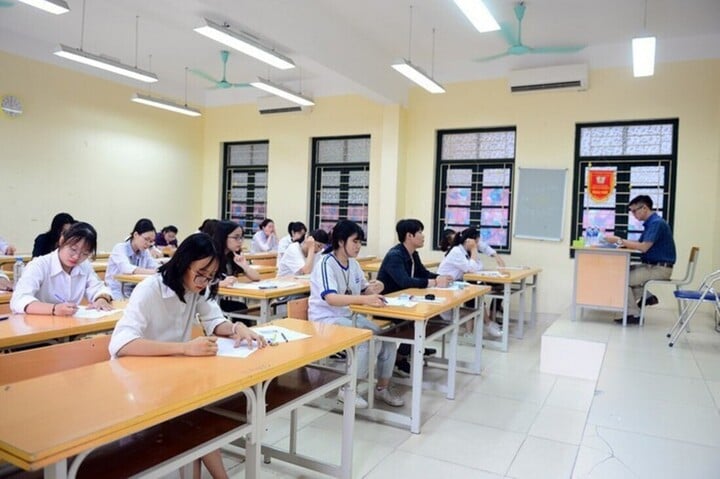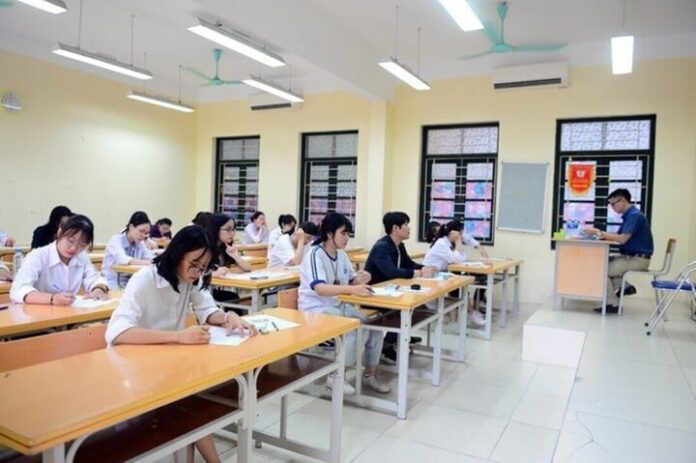To ensure the continuity of education and training activities across the country during the reorganization of local governments, and to protect the interests of learners, the Ministry of Education and Training has issued Official Dispatch No. 1581 on maintaining and improving the quality and efficiency of public educational institutions at local administrative units implementing a two-tier local government model.

Is there a need to change school names after the elimination of district-level administration and provincial mergers? (Illustrative image)
Accordingly, the Ministry of Education and Training requests the People’s Committees of provinces and cities to perform educational state management functions related to professional matters of the industry, recruitment, arrangement, secondment, and development of teachers, which will be implemented uniformly across the province by the provincial-level specialized agency to regulate the surplus and shortage of teachers locally.
After the merger of provinces and the elimination of the district level, local governments will retain educational institutions and transfer the management function of preschool, primary, and lower secondary schools to the communal-level authorities.
In Official Dispatch No. 1581 and related documents, the Ministry of Education and Training does not mention changing school names after implementing the two-tier local government model. Therefore, schools do not need to change their names at this time.
However, as most schools in many localities still have names that include terms like “town,” “township,” “ward,” or “commune,” their names may no longer be appropriate after the mergers and will need to be changed to reflect the new reality. This decision will be made by the local authorities.
Appointment of Principals and Vice Principals
- Advising and submitting to the Provincial People’s Committee and authorized agencies for approval of job positions and public employee quotas for public schools.
- Recruiting, employing, appointing, changing professional titles, training, fostering, and evaluating teachers, educational managers, and staff of public schools.
- Developing plans for the recruitment, employment, and training of teachers in localities and schools within the province.
- Ensuring sufficient numbers of public employees and employees as approved in the plan by the Provincial People’s Committee and taking responsibility for explaining the activities, quality of education, teachers, employees, and students.
- Authorizing the appointment, dismissal, and transfer of principals and vice principals of schools.
- Regularly updating teacher and management staff information in the National Education Database and providing access to this information to the Provincial People’s Committees and the Ministry of Education and Training.
Based on the above, it can be seen that the appointment of principals and vice principals will be the responsibility of the Provincial Departments of Education and Training in the absence of the district level.
The Future of FDI: Businesses Embrace Dynamic Strategies for Quality Talent
Human resources are undoubtedly one of Vietnam’s most significant strengths in attracting foreign direct investment (FDI), especially with the country’s current demographic dividend of approximately 1.8 million university and college graduates annually. However, this number seems insignificant when compared to the ever-growing demand for talent by FDI enterprises, which continues to surge year after year.
The Luxury Goods Tycoon, Johnathan H. Nguyen: ‘The Vietnamese Mind is as Sharp as Any, It’s Just Underutilized’
“I want to emphasize that Vietnamese intellect is not inferior to anyone else’s. However, to unlock this potential, students must prioritize their education. This was the key message shared by Mr. Johnathan Hanh Nguyen, Chairman of the Inter-Pacific Petroleum Group (IPPG), during a talk with students from the University of Economics, Vietnam National University, Hanoi, on the morning of May 7th.”
The New Era of the Semiconductor Race: Seizing the Opportunity to Soar
To seize the opportunity to leap forward in the race to manufacture semiconductor chips, Vietnam should focus on training a high-quality engineering workforce, according to experts.





















